|
|
The
Truth about Heat, Oxidation and Juice Quality
by John Kohler One of the questions that we have
been getting more frequently is regarding fresh juice quality. Some say that
heat is created by centrifugal juicers in the process of juicing.
There are several web sites that claim centrifugal juicers and other
"high speed" juicers "heat your juice". Other web sites say that
single auger juicers "heat your juice". Some manufacturers say that heat
is bad for your juice.
Here are a few specific quotes that were copied directly from
various web sites:
- The higher RPM's of the centrifugal juicers causes
more heat and more oxidation (foaming action) to the food being crushed, which decreases
the nutrients in the food.
- As the food is pushed through the chute, the slower
crushing action of a masticating juicer provides a more effective crushing action than a
centrifugal juicer, creating less heat resulting in less damage to the food being crushed.
- This process of crushing and squeezing extracts more
juice and also has less heat build up than from the high speed at which centrifugal
juicers work, which destroys the enzymes and other vital nutrients.
- ... It's specially designed to be quiet while at the
same time preserving vital nutrients and enzymes often destroyed by friction, heat and
oxidation caused by other juicers.
- Because Twin Gear juicers operate at a lower speed
they also tend to produce less heat.
- Centrifugal juicers run at higher speeds and produce
more heat than the twin-gear or single auger juicers and introduce more oxygen into the
juice.
- We are all aware these days that cooking kills
essential vitamins and enzymes in food. Are you aware that fast high-speed juice
extractors have the same destroying effects, because high speed and friction = heat.
- Since there is no heat generated, all of the enzymes
are preserved for a fresh and 'live' tasting juice.
These statements would lead a person to believe that certain juicers
are really bad, and produce a juice that is no good. Well read this article to
learn the truth. We don't just tell you, we back up our statements by measuring the
temperatures of the juices produced by various juicers.
Who is right, and who is wrong? Do the web sites have a reason
for saying this? Hopefully this article will dispel those myths once and for all.
First off I would like give you some background information about
myself.
- I have been juicing for over 25 years.
- About 10 years ago, I started juicing almost everyday due to a health
crisis. (Primarily using a centrifugal ejection juicer).
- About 7 years ago I started this web site, writing many comparison
charts and reviewing juicers. I use or have used most of the major brand juicers on
the market.
- Several juicer manufacturers value my web site and opinions, that
they provide me with prototype juicers before they are released to the public for my
evaluation and to get my feedback.
First, we would need to define the nutrients in juice to see if they
would be affected by the juicing process.
- Purified Water
- Vitamins
- Minerals
- Enzymes
- Phytochemicals including Antioxidants
- Proteins
- Carbohydrates
- Fats
- Fiber
- Other Unknown Nutrients
Of all these nutrients, I would be concerned with the loss of
Phytochemicals, including Antioxidants and some vitamins. Those are probably the most
sensitive nutrients in juice.
The two main factors that effect juice quality are: Heat and
Oxidation.
- Heat can affect the juice mainly by causing enzyme
deactivation. Enzyme deactivation ONLY occurs when temperatures exceed 118
degrees fahrenheit. In addition to the heat, there is a time component associated
with enzyme deactivation. For example you could probably heat juice to 130 degrees
for 1 nano-second with no enzyme deactivation. Passing your finger over a flame is a
similar example. (this is not advised).
- Oxidation occurs when you break open cell walls of the produce and
expose it to oxygen. Oxidation occurs when you cut open an apple and it turns brown.
In general, oxidation does affect the quality of the juice. Many of the nutrients in the
juice are not affected by oxidation, but some are. Oxidation is a natural process.
Its best to minimize oxidation. One way to minimize oxidation is to CONSUME
THE JUICE RIGHT AFTER IT IS MADE. It is true that some juicers minimize the
oxidation that occurs while the juice is being created. The table below shows my
ranking of juicers from most to least oxidation created during juicing.
| Most |
Centrifugal Juicer (omega 1000,
Omega 9000, Acme) |
|
Centrifugal Ejection
(high speed - 8000+ rpm Breville, Lequip Mini |
|
Centrifugal Ejection
(low speed 3600rpm) - Nutrisource 1000, Lequip 221 |
|
Masticating Juicer - Champion
Juicer |
| Least |
Single Auger Juicer / Twin Gear
Juicer |
Oxidation created during the juicing process is
just one factor that should be considered if you own, or are looking to purchase a juicer.
Please review this article that talks about selecting a juicer
based on your needs.
Ok, enough with all the "small talk". Here is the testing
we did with three juicers and measuring the temperature of the juicer blade (or auger),
the temperature of carrots before juicing, temperature of the blade (or auger) after
juicing, temperature of the pulp after juicing, and temperature of the juice. You
can see for yourself if these various style juicers "HEAT THE JUICE"
HEAT THE JUICE TEST #1
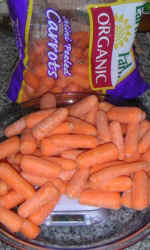 Method: We measured out 24 ounces of baby organic carrots
for this test. We used Earthbound farm baby carrots. The carrots came out of
the same bag, and were of the same batch. The baby carrots are pre-washed
which greatly reduces preparation time. The 24 ounces of carrots were fed into each
machine and the temperatures were taken. The temperatures were taken with an
infrared thermometer. The sensor in an IR thermometer collects a small amount of
energy radiated from the target, generates an electrical signal that is amplified by a
precision amplifier and converted into voltage output, which is then converted into the
temperature using a mathematical equation. Many chefs now use the IR thermometers,
since they are non-contact thermometers. The results are shown below.
The hand grater test was added in at the last minute to show the effects that a standard
hand grater would have on a normal size large carrot. The average temperatures are
shown below: Method: We measured out 24 ounces of baby organic carrots
for this test. We used Earthbound farm baby carrots. The carrots came out of
the same bag, and were of the same batch. The baby carrots are pre-washed
which greatly reduces preparation time. The 24 ounces of carrots were fed into each
machine and the temperatures were taken. The temperatures were taken with an
infrared thermometer. The sensor in an IR thermometer collects a small amount of
energy radiated from the target, generates an electrical signal that is amplified by a
precision amplifier and converted into voltage output, which is then converted into the
temperature using a mathematical equation. Many chefs now use the IR thermometers,
since they are non-contact thermometers. The results are shown below.
The hand grater test was added in at the last minute to show the effects that a standard
hand grater would have on a normal size large carrot. The average temperatures are
shown below:
| |
Lequip Mini 110.5 |
Omega 8005 |
Healthy Juicer Electric |
Hand Grater |
| Juicer Style |
Centrifugal Ejection |
Single Auger Dual Stage |
Single Auger |
NA |
Temperature of
Blade (or auger) before Juicing |
59.9 deg F |
59.0 deg F |
60.0 deg F |
59.3 deg F |
| Temperature of the Carrots |
34.1 deg F |
34.1 deg F |
34.1 deg F |
41.0 deg F |
| Temperature of the Blade (or
auger) after juicing |
43.5 deg F |
49 deg F |
56.4 deg F |
53.2 deg F |
| Temperature of the Carrot Pulp |
41.0 deg F |
50 deg F |
49.0 deg F |
50.0 deg F |
| Temperature of the Juice |
46.0 deg F |
45 deg F |
46.5 deg F |
NA |
| Temperature Increase from the
carrot to the juice. |
+11.9 deg F |
+10.9 deg F |
+12.4 deg F |
+9 deg F |
| Decrease in temperature of blade
(or auger) |
-16.4 deg F |
-10 deg F |
-3.6 deg F |
-6.1 deg F |
| Overall Yield |
12 ounces |
13 ounces |
9 ounces |
NA |
| Comments on Juice |
Virtually Pulp Free |
Small Bits of Pulp in Juice |
Most Pulp left in Juice |
NA |
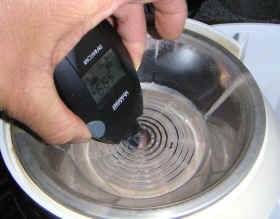 First, you can
see that the blade (or auger) of the juicer was warmer than the carrots being put through
the juicer. This is because the juicer is at room temperature. The carrots just came
from the fridge. The difference in the temperature of the blade (or auger) can be
explained by the different material the blade (or auger) is manufactured from (metal or
plastic) and where it was stored in the kitchen (in a cupboard, or on the counter). First, you can
see that the blade (or auger) of the juicer was warmer than the carrots being put through
the juicer. This is because the juicer is at room temperature. The carrots just came
from the fridge. The difference in the temperature of the blade (or auger) can be
explained by the different material the blade (or auger) is manufactured from (metal or
plastic) and where it was stored in the kitchen (in a cupboard, or on the counter).
Second, you can see the temperature of the blade after juicing the
carrots was LOWER then when we started? Why is this? Well, this is due to the
fact that the carrots were COLD. They transferred their "cold" to the
blade or auger of the juicer. The temperature of the blade was roughly
somewhere in the middle. Some juicers were more effective at lowering the blade
temperature, such as the Lequip mini with its stainless steel blade, it really seemed to
cause the temperature to drop on the blade. The drop was not as significant on the
other juicers since the augers are primarily made of plastic, which does not transfer cold
as well.
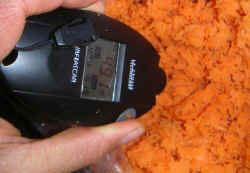 Third, you see the temperature of the carrot pulp, which is fairly consistent
with the temperature of the blade. With the exception of the electric
healthy juicer. This can possibly be explained by the healthy juicer electric
having a plastic auger with metal insert. Third, you see the temperature of the carrot pulp, which is fairly consistent
with the temperature of the blade. With the exception of the electric
healthy juicer. This can possibly be explained by the healthy juicer electric
having a plastic auger with metal insert.
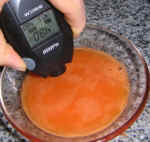 Fourth, you see the temperature of the juice, which shows that the juice
produced by all the juicers were all within 1.5 degrees of each other. They are all
fairly similar. Fourth, you see the temperature of the juice, which shows that the juice
produced by all the juicers were all within 1.5 degrees of each other. They are all
fairly similar.
Finally, you see the overall temperature change from going from the
starting product, organic baby carrots, to the end product, organic baby carrot juice.
The Omega 8005 changed the temperature the least by only 10.9 degrees F, followed
by the Lequip Mini 110.5, which changed the temperature by 11.9 degrees F. The
Healthy Juicer Electric Changed the temperature the most at 12.4 degrees F. For fun,
to demonstrate the heat transfer, I took a whole carrot, and shredded it against a
standard "fine shredder" like you would use if you were shredding carrots over a
salad. That shows the temperature changed a total of 9 degrees. So the results
with using an electric juicing machine is only a few degrees higher.
HEAT THE JUICE TEST #2
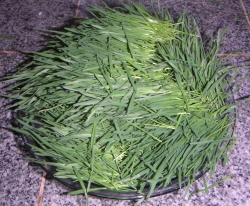 Method: We cut a tray of organic-home-grown wheat grass
that friends grew (thanks Rick & Karin). It was at room temperature. The
wheat grass was grown outside, and not refrigerated. After cutting the whole tray,
it yielded 5.4 ounces of fresh cut wheat grass. We measured out 2.7 ounces for each
juicer. The Lequip Mini Juicer was not included, since it does not effectively
juice wheatgrass. Wheat grass due to its nature, requires a special wheat grass juicer. These special juicers are usually a
single auger style, or twin gear style. The same IR thermometer was used as in
the first test. The wheatgrass pulp was fed through back through the juicer about a
dozen times to get a higher yield. Method: We cut a tray of organic-home-grown wheat grass
that friends grew (thanks Rick & Karin). It was at room temperature. The
wheat grass was grown outside, and not refrigerated. After cutting the whole tray,
it yielded 5.4 ounces of fresh cut wheat grass. We measured out 2.7 ounces for each
juicer. The Lequip Mini Juicer was not included, since it does not effectively
juice wheatgrass. Wheat grass due to its nature, requires a special wheat grass juicer. These special juicers are usually a
single auger style, or twin gear style. The same IR thermometer was used as in
the first test. The wheatgrass pulp was fed through back through the juicer about a
dozen times to get a higher yield.
| |
Omega 8005 |
Healthy Juicer Electric |
Temperature of
auger before Juicing |
62.0 deg F |
63.0 deg F |
| Temperature of the Wheat Grass |
54.3 deg F |
54.3 deg F |
| Temperature of the auger after
juicing |
84.0 deg F |
74.4 deg F |
| Temperature of the wheat grass
pulp |
85.4 deg F |
74.4 deg F |
| Temperature of the Wheat grass
Juice |
62.5 deg F |
62.0 deg F |
| Overall temperature change
from the wheat grass to the juice. |
+8.2 deg F |
+7.7 deg F |
| Increase of Temperature of the
Auger |
+22 deg F |
+11.4 deg F |
| Overall Yield of Wheat greass
Juice |
1.333 ounces |
.833 ounces |
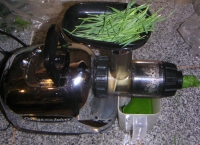 This test was
more straightforward than the carrot test. The beginning blade temperature of the
Omega 8005 and Healthy Juicer were within 1 degree of each other. This test was
more straightforward than the carrot test. The beginning blade temperature of the
Omega 8005 and Healthy Juicer were within 1 degree of each other.
The temperature of the auger after juicing got a bit warm.
This is primarily because the wheatgrass gets wrapped around the auger, and it rotates
against the housing, which causes friction, which then causes heat to develop in the
pulp. The temperature of the pulp then transfers to the auger. The carrots did
not do this, since carrots contain less stringy-fibers so its easier ejected out of the
juicer,so less friction occurs. It would have helped if the wheatgrass was put in
the fridge to begin with, so we would be able to get some "coldness" transfer to
the auger.
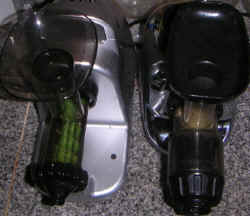 In the end, the wheat grass juice was warmer than the starting wheat grass.
This was due to the friction caused when juicing the wheatgrass. This probably would
not have been that much of a problem if we fed the wheat grass through the juicer only
once. We took the wheatgrass pulp after it came out of the juicer and fed it
back through the juicer about a half dozen times, to increase yield. Each time
we did this, it caused the juicer to work harder, causing more friction and heat.
The wheatgrass was diluted with fresh orange/tangerine juice, and enjoyed. In the end, the wheat grass juice was warmer than the starting wheat grass.
This was due to the friction caused when juicing the wheatgrass. This probably would
not have been that much of a problem if we fed the wheat grass through the juicer only
once. We took the wheatgrass pulp after it came out of the juicer and fed it
back through the juicer about a half dozen times, to increase yield. Each time
we did this, it caused the juicer to work harder, causing more friction and heat.
The wheatgrass was diluted with fresh orange/tangerine juice, and enjoyed.
Conclusion:
- This test shows that all juicers change the temperature of the
starting produce.
- The temperature increase was more when friction was involved.
- All Centrifugal, Single Auger, Masticating, Twin Gear Juicers produce
"fresh, Live, Juice" that contain their full complement of enzymes.
Questions and Answers:
So does juicing "heat" the juice, as some of the
web sites would lead you to believe?
YES, based on the starting temperature of the carrots, and the ending temperature of the
juice. ALL JUICERS change the temperature of the newly created carrot juice.
YES, even twin gear juicers will change the temperature.
Is this a bad thing to increase the temperature of the end
product?
I do not think so. As long as the temperature does not exceed 118 degrees, I feel
the extra 10 to 12 degrees is not a problem. Just be sure to start with cold carrots, for
best results. There will be minimal (if any) nutritional damage to the juice in my
opinion.
Does heat damage the juice?
I would tend to believe that the extra 10 to 12 degrees that ALL JUICERS produce is not a
problem. What is more of a problem is the OXIDATION that occurs when the juicers
rupture the cell walls, which protects the cells from oxidation.
Does the heat make the nutrition less?
Probably not, unless the heat exceeds 118 degrees.
Do all juicers produce oxidation?
Oxidation occurs with all juicers. Some juicers create less oxidation in the process
of juicing. (See table above). Oxidation increases, the longer the juice is
sitting around. So to MINIMIZE oxidation, its more important to DRINK THE JUICE
RIGHT AFTER ITS MADE than to worry about, "oh, my centrifugal juicer produces more
initial oxidation". If you cut open an apple, oxidation is created (it turns
brown). You never see the browing occur if you eat the apple as soon as you cut it!
Does the oxidation make the nutrition less?
Yes, oxidation immediately affects the juice. Oxidation created during the
juicing process will happen with all juicers. Here is a question I would ask you:
Is the nutrient value of an apple that has been cut open and left out to
"oxidize" for 1 hour much different than an apple that has been allowed to
"oxidize" for 1.5 hours? Probably not much difference. I think many people
exaggerate the "damage" done by the oxidation caused by juicers. It's like
splitting hairs in my opinion.
Do some juicers produce less oxidation than others?
It is true that different juicers produce less oxidation probably due to the effectiveness
of the juicers ability in breaking open the cell wall to release the nutrients inside.
That is beyond the scope of this article, but in general, the juicers that produce less
oxidation during juicing, are more effective at creating a higher quality juice to begin
with.
Is heat or oxidation worse?
In my opinion, oxidation is much worse than 10-15 degree change in the temperature of the
produce being juiced.
Do I really need to worry about oxidation and heat in my
juice?
I believe manufacturers talk about oxidation and heat to influence your purchase decision.
Hopefully this article will dispel some of those myths. Heat should not be a
factor, since all juicers will raise the temperature of the produce being juiced.
Oxidation plays a role in the quality of juice, this is true. I would recommend
taking the oxidation factors "lightly". One could purchase the best
juicer that produces the least oxidation, only to have it sit on the counter, and it never
being used, since they didn't consider that its one of the hardest juicers to clean.
I have found that if a juicer is hard to clean, it will not get used, then what is the
advantage of having "the best" juicer, if its never used?
Are there still benefits of juice made with centrifugal
juicers?
I would say there is definitely still benefits from juice created with juicers that create
the most oxidation. There is no doubt about it, drinking fresh-made juice is
better than any PASTEURIZED (cooked), shelf-stable, enzyme-less juice, a soda, coffee or
many other beverages the average person consumes. Remember eating some
vegetables is better than eating none at all. I think this subject is
"splitting" hairs for most healthy people, and should not be a major factor for
most people. Of course, if I had a serious medical condition, I would spare no
expense, and be sure to give myself every advantage, including purchasing a juicer that
would probably create the highest quality juice.
Do any juicers "Cook" Juice?
None of the juicers we sell "cook" juice. There is a juicer called a steam
juicer that does "cook" your juice. We do not recommend this type of juicer.
No matter which juicer you purchase from us, be assured, drinking fresh fruit and
vegetable juice is an excellent way to include more fresh fruits and vegetables in your
diet. Be it least oxidation, or "a little more", fresh juice is STILL GOOD
STUFF. Fresh Juice is better than any store purchased juice, soda, coffee, etc.
What about juices purchased in the store? Are they
"cooked"
Juices that you purchase in the store, are most often pasteurized, and are COOKED- to kill
the enzymes, so they can have shelf-life. I would agree these types of juices are
not as good as FRESH made juices you make at home with your juicer.
How did this "heat in the juice" thing start?
I have thought long and hard about this one. I believe that a manufacturer or
retailer got the context of oxidation created by juicers and heat created by juicers
confused. They published this information online or in brochures, and then other
retailers and manufacturers simply copied and added-to the heating the juice myth. This
has been taken way out of context in my opinion. I frequently get people
"scared" about the heat or oxidation caused by juicers. It's nothing to
fear or be scared about anymore. Fresh juice made with your juicer is not
worthless. Hopefully this article shows the truth regarding heat and juice.
How can I increase the quality of juice that I make with my
juicer?
There are a few ways I would suggest:
- Start off with the coldest possible produce- leave the produce in the
fridge before juicing. Set your fridge a little colder.
- Do not overload the juicer. Feed in only a little produce at a
time. Let it work itself out of the juicer before adding more. Overloading will
cause the juicer to work harder, causing excess friction and generating heat.
- While juicing, occasionally juice a ICE CUBE, which will help to
reduce the temperature of the blade/auger and the juice. It will also dilute the juice.
- Be sure to inspect the cutting blade (on centrifugal juicers) or
cutter (on the champion juicer). Replace if they are dull. Dull blades do not
cut as well, and thus will cause excess friction, which generates heat.
- Juice in small batches, rather than "juice marathons".
The longer the juicer runs, the warmer things get.
- You can put your juicing parts (blade or auger) in the fridge,, so
they starting at a low temperature to begin with. (This step is not necessary in my
opinion, and may cause premature failure of the juicer parts.)
- Start off by juicing the highest quality produce available. In
some studies, Organic crops have been shown to be higher in some vitamins, essential
minerals and phytonutrients.
- If your juicing with a CHAMPION Juicer, chop produce into smaller
pieces. Produce with strings will get stuck around the cutting blade and cause more
friction and heat. (especially Celery and leafy greens with long stems)
- JUICE CONSISTANTLY and DRINK YOUR JUICE AS SOON AS YOU MAKE IT
(DO NOT STORE IT) FOR HIGHEST QUALITY. THIS IS THE MOST IMPORTANT FACTOR, IN MY OPINION
ABOVE ALL OTHERS. IT'S MORE IMPORTANT THAN WORRYING ABOUT BOTH HEAT and OXIDATION.
I already own a centrifugal ejection juicer, do you think
that's ok?
There is no doubt in my mind that people who juice regularly reap the benefits of juicing,
regardless of the type of juicer they are using. When I first started juicing, I
used a centrifugal ejection style juicer, and loss weight, had more energy, and felt
great. You might want to read this article regarding
purchasing a new juicer if you already own one.
If there was one juicer that you said heated the juice the
most, which model would it be?
I would have to say the champion tends to heat the juice, and would heat the produce the
most. The champion operates in a way that the most friction is created at the
highest rpm (speed). This is intensified if your blade is dull, or you try to juice
too fast. |


